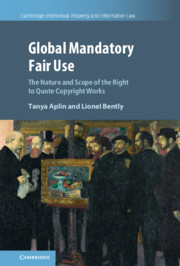Book contents
- Global Mandatory Fair Use
- Cambridge Intellectual Property and Information Law
- Global Mandatory Fair Use
- Copyright page
- Contents
- Acknowledgements
- Table of Legislation
- Table of Cases
- 1 Introduction
- 2 The History of Article 10(1) Berne
- 3 Preliminary Considerations about the Nature of the Quotation Exception
- 4 Article 10(1) Berne: Requirements
- 5 Article 10(1) Berne: The Meaning of Quotation
- 6 Article 10(1) Berne: Fair Practice
- 7 The Consequences of Global Mandatory Fair Use
- 8 Conclusion
- Bibliography
- Index
- Cambridge Intellectual Property and Information Law
3 - Preliminary Considerations about the Nature of the Quotation Exception
Published online by Cambridge University Press: 26 October 2020
- Global Mandatory Fair Use
- Cambridge Intellectual Property and Information Law
- Global Mandatory Fair Use
- Copyright page
- Contents
- Acknowledgements
- Table of Legislation
- Table of Cases
- 1 Introduction
- 2 The History of Article 10(1) Berne
- 3 Preliminary Considerations about the Nature of the Quotation Exception
- 4 Article 10(1) Berne: Requirements
- 5 Article 10(1) Berne: The Meaning of Quotation
- 6 Article 10(1) Berne: Fair Practice
- 7 The Consequences of Global Mandatory Fair Use
- 8 Conclusion
- Bibliography
- Index
- Cambridge Intellectual Property and Information Law
Summary
An important starting point is our claim that Article 10 of the Berne Convention creates an obligation on Members of the Union to recognise a limitation on the copyright that allows for quotation. The proposition is based primarily on the language used: Article 10 begins with the words, ‘It shall be permissible … ’. This imperative language may be contrasted with Article 10(2) Berne, which, in relation to exceptions for education states: ‘It shall be a matter for legislation in the countries of the Union … to permit’. Similar permissive language is also found in Article 10bis in relation to reporting current events and Article 9(2), which allows exceptions to the reproduction right ‘in certain special cases’. The language of Article 10(1) is distinct and clearly reads as mandatory rather than permissive. Although there is barely any reference to the mandatory nature of the exception in the Stockholm travaux, the limitation is described in terms that reflect its basis in the entitlement of the user.
Keywords
- Type
- Chapter
- Information
- Global Mandatory Fair UseThe Nature and Scope of the Right to Quote Copyright Works, pp. 29 - 68Publisher: Cambridge University PressPrint publication year: 2020

